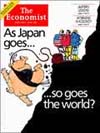
Economist, June 20
(posted Saturday, June 20, 1998)
The cover editorial warns that Japan's economic woes are real and are not going away. Japan must reform its banks and maintain loose fiscal and monetary policy (even though that means a cheapened yen), or the rest of the world will soon feel the aftershocks of its recession. Dilemma for America: We should be raising interest rates to keep our overheating economy in check, but a rate hike would worsen Asia's problems by hurting its debtors. ... A story says company directors' investing habits are a good gauge of where the market is heading. Lately, directors have been overwhelmingly selling their own companies' shares. ... An essay urges England to withdraw its soccer team from the World Cup if it is unable to squelch the violence of hooligan fans. British thugs have already begun rioting in France this summer.
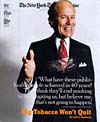
New York Times Magazine, June 21
(posted Friday, June 19, 1998)
The cover story profiles Steven F. Goldstone, RJR Nabisco chairman and Big Tobacco defender. Unlike other tobacco VIPs, Goldstone willingly admits the weed is addictive, carcinogenic, and evil (and that firms may have marketed cigarettes to kids), yet he's leading the fight against congressional sanctions. Goldstone finally decided a settlement didn't make fiscal sense and that he'll continue to manufacture cigarettes until tobacco itself is illegal. ... A story says exiled Chinese dissident Wei Jingsheng may not be the best activist for his cause. Wei's a weak political theorist, and his long imprisonment has left him naive about the workings of the modern world. (He still views China as Maoist.) Still, Wei's indomitable charm and spirit make him a formidable foe for Beijing. ... An article traces a promising development in the search for an AIDS cure. Some HIV patients quit drug regimens and find their immune systems, having been bolstered by the drugs, are suddenly able to fight the virus without help. This could lead to a vaccine.
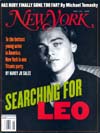
New York, June 22
(posted Thursday, June 18, 1998)
The world's hottest celebrity is exposed. The hilarious cover story chronicles Leonardo DiCaprio's misadventures in Manhattan. DiCaprio and his misogynist, potty-mouthed entourage don't tip at restaurants (or strip clubs), brawl with detractors, throw food at photographers, and ooze sleaze. Sample: Leo's bad boys phoned actress Elizabeth Berkley (Showgirls) at all hours of the night, hoping she'd leave her boyfriend and join them for drinks. When her boyfriend finally told them to stop bothering her, one of Leo's posse sucker-punched him.
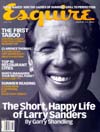
Esquire, July 1998
(posted Thursday, June 18, 1998)
Esquire's coup: face time with the reclusive Clarence Thomas. The piece finds the Supreme Court justice bitter at his lot and deeply suspicious of the white world. Thomas counsels successful young black men that, upon leaving their neighborhoods, "you won't ever really be able to go back. But you may find you're never fully accepted up ahead, either, that you've landed between worlds. That's the way I feel sometimes, even now, and it can make you angry." ... A story says the top five restaurant cities other than New York City are (in descending order): San Francisco, Chicago, New Orleans, Los Angeles, and Boston. ... Rick Moody and David Foster Wallace contribute short fiction to a summer reading package.
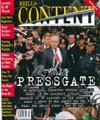
Brill's Content, July/August 1998
(posted Wednesday, June 17, 1998)
The debut issue of a magazine billing itself the "independent voice of the information age." Overall tone: sanctimony, exemplified by the series of "lessons" to the press at the end of the cover story ("no one should read or listen to any media outlet that consistently shows that it is the lapdog of big, official power rather than a respectful skeptic"). The much-touted 30 page cover piece ("Pressgate") carefully reconstructs coverage of the Lewinsky scandal, congratulating a few responsible reporters and tsk-tsking almost everybody else for uncritically accepting Kenneth Starr's leaks. It blames the scandal on 1) Linda Tripp's desire for a book contract; 2) Lucianne Goldberg's hatred of the president and lust for attention; and 3) Starr's self-righteousness. The piece also breaks the news that Starr admits leaking to the press--something Starr had previously denied. ... Actor George Clooney pens an editorial urging the press to be more truthful. Speaking of the Lewinsky scandal, about which several press outlets tried to interview him, Clooney writes, "I am an actor (unless you saw Batman), so how could my thoughts on this subject be newsworthy?" Exactly. ... Throughout the magazine, short pieces offer insider looks at the media biz, including a feature listing selected journalists' salaries.
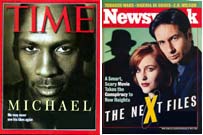
Time and Newsweek, June 22
(posted Tuesday, June 16, 1998)
Time's cover story celebrates Michael Jordan's reign as the greatest basketball player ever and weighs the evidence about whether His Airness will retire. (Conclusion: No one knows for sure whether he'll stay or go.) A sidebar claims Jordan is only the second greatest athlete in history, behind soccer's Pele. An accompanying piece doubts we will see another hoopster like Jordan--his dedication to his team and to improving his game is unmatched by today's young players. ...Newsweek's cover piece hypes the new X-Files movie, profiling its creator and stars--all of whom sound obnoxious. Sidebars explain the show's alleged symbolism. (Scully's crucifix signifies "her faith in God, vs. Mulder's paranormal paganism.")
Time says our defense of Taiwan could lead to a war with China. Tensions are escalating over Taiwan's independence, and we will be forced to take sides. An interview with Taiwan's president finds him fiercely pro-independence and fairly confident of American backing. ...Time is the latest magazine to discover that "crank" (smokable methamphetamine) is sweeping the heartland. The speed-like substance can be cooked up at home and attracts women, who often use it as a diet aid.
Newsweek charts Viagra's course toward world domination. Single pills can cost up to $175 on foreign black markets, and Japanese businessmen take "Viagra Tours" to find the drug legally. The anti-impotence pill will soon be approved for use on several continents.
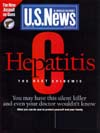
U.S. News & World Report, June 22
(posted Tuesday, June 16, 1998)
Several weeks after a New Yorker scare piece on Hepatitis C, U.S. News' cover story calls the virus the "next epidemic." The disease infects four times as many Americans as AIDS does, with no visible symptoms and no effective cure. Hep C is transmitted much like AIDS (blood transfusions, sharing needles, sex) and silently eats away at the liver. ... An interesting piece illustrates the utter chaos of Russia's economy. Companies literally pay their taxes in vodka and do most of their business in barter. ...U.S. News finds a new tourist hot spot: Iran. Beautiful historical sites and friendly locals abound. Just ignore all the signs reading "Down with U.S.A."--and ladies, don't show too much ankle.
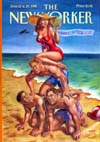
The New Yorker, June 22 and 29
(posted Tuesday, June 16, 1998)
The summer fiction issue's star attraction: excerpts from Jack Kerouac's journal, including notes from a cross-country trip with Neal Cassady. (Those travels helped inspire On the Road.) Kerouac mocks his friend Allen Ginsberg, honors the "Spirituality of Hashish," and records a "batting average" for writing. ("After today's work, my 'batting average' rose to .306. The point is, I've got to hit like a champion.") ... Half a dozen writers offer brief memoirs of summer: Arthur Miller recalls Manhattan in the '20s, when hundreds of families slept in Central Park to escape the heat. ... Short story contributors include Stephen King, Alice Munro, and E. Annie Proulx.
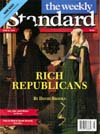
Weekly Standard, June 22
(posted Tuesday, June 16, 1998)
The cover story analyzes the split between "Rich Republicans" and conservative activists. Republicans in wealthy towns like Winnetka, Ill., are pleased that America is prosperous and peaceful, and appalled by the vitriolic, negative activism of conservatives. Conservatives resent the passivity and sluggishness of Rich Republicans. There's no easy way to reunite the two groups. ... An article wades into the fish car-ornament controversy, making the case that the ornament showing a fish with legs and the word "Darwin" is a grotesque affront to Christians. The Darwin ornament offends because it assumes that all Christians who have a plain fish ornament are know-nothing creationists.
--Seth Stevenson